High potassium levels in your blood can cause hyperkalemia and adversely impact your health. But what causes high potassium levels in elderly? Let’s find out in the article below.
Contents
One of the main functions of kidneys includes filtering out potassium from the blood and its removal with urine. With age, kidney functions start deteriorating, leading to elevated potassium levels or hyperkalemia in the elderly.
Older adults are more prone to developing chronic kidney disease. According to a recent estimate, about 38% of people aged 65 or above suffer from chronic kidney disease. The risk of hyperkalemia is even more prominent in older adults suffering from chronic kidney disease.

Suffering from hyperkalemia can adversely affect the health of the elderly and must not be left untreated. Let’s take a look at what are the possible causes, symptoms, and treatments for hyperkalemia.
What is a Safe Potassium Level?
In adults, the normal or safe potassium level can range from 3.7 to 5.2 ,millimoles per liter or mEq/L. Potassium levels higher or lower than that can result in serious health issues in the elderly. You should immediately consult a doctor if your blood potassium level increases above 6 mEq/L or below 3.5 mEq/L.
Why Are the Elderly At Higher Risk of High Potassium Levels?
With age, a lot of body functions start declining, leading to many health issues in the elderly. One such issue is increased potassium levels in the blood, which can lead to serious health problems. According to the CDC, older adults are at higher risk of high potassium levels. There are several reasons for elevated potassium levels in older adults.

1. Chronic Kidney Disease
With age, kidney functions decline, and its ability to filter blood slows down. Filtering out potassium from the blood is one such kidney function that slows with age and results in high potassium levels in the blood. Also, elder people suffering from chronic kidney disease have an increased risk of increased potassium levels.
2. High Potassium Diet
Eating a potassium-rich diet can also be the culprit behind increased potassium levels in the elderly. Food items like yogurt, bananas, oranges, tomatoes, and others contain high potassium levels and can result in high potassium levels in your body. Some salt substitutes are also high in potassium.
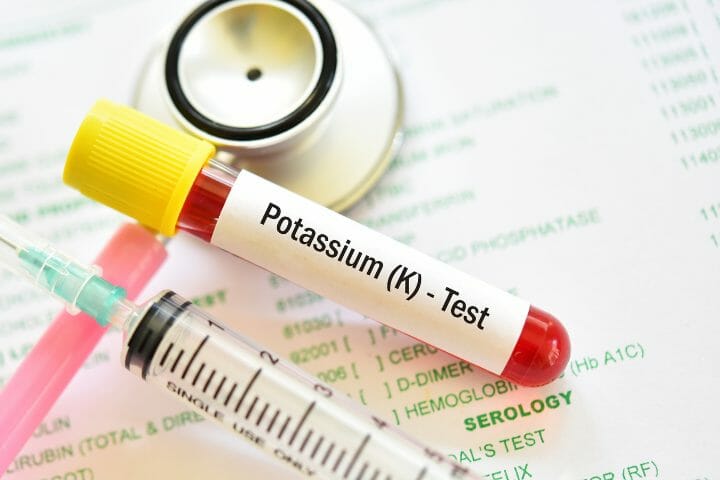
2a. High potassium foods to avoid
Kidney disease can lead to increased potassium levels in your body as the kidney’s capacity to filter blood diminishes. One of the easy and best ways to lower the elevated potassium level in your body is by making changes in your diet. By avoiding food items high in potassium, you can effectively reduce the potassium level in your body.
- Chicken
- Beef
- Nuts
- Low-sodium cheese.
- Milk products
- Dried apricots
- Pumpkin
- Protein
- Milk
- Bran products
- Split peas
- Spinach
- Lentil
- Brussels sprouts
- Potatoes are sweet and regular
- Raisins
- Avocados
- Prune juice and prunes
- Orange juice and oranges
- Tomato, Tomato sauce, and tomato juice
3. Medicines
Older adults are often on medications for health conditions. Medication for high blood pressure, anti-inflammation, and several others can increase the potassium level in your body. If you have an increased potassium level in your body, then the medicines you are taking might be the reason.
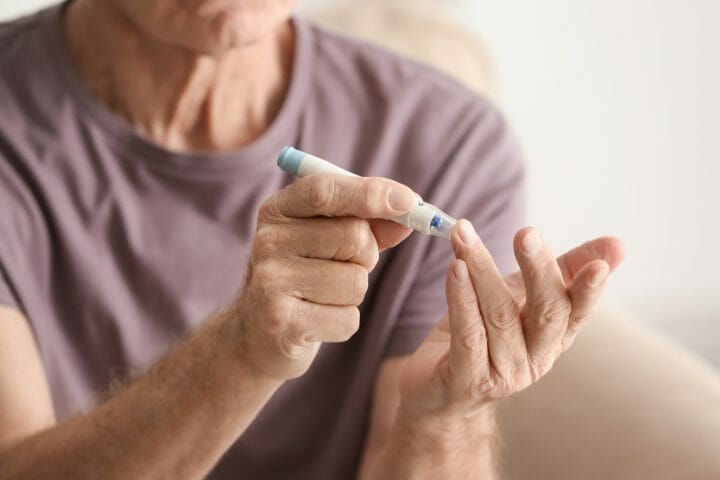
3a. What medications cause high potassium?
If you are suffering from hyperkalemia, a condition in which there is too much potassium in your body, there is a chance that your ongoing medication might be the issue.
- Angiotensin II Receptor Blockers or ARBs medications used for treating elevated blood pressure levels can also raise potassium levels.
- Angiotensin-Converting Enzyme or ACE, a type of blood pressure medication, can also raise potassium levels.
- Aldactone or Spironolactone, a medicine for PCOS, acne, and heart disease, can result in the kidney not filtering out potassium.
- Non-steroidal anti-inflammatory or NSAIDs like Advil or ibuprofen.
- Heparin
- Cyclosporine and tacrolimus
- Labetalol and Propranolol, beta-blockers, also cause the elevated potassium level
- Herbal remedies and herbal supplements
4. Diabetes
There are multiple studies that link low level of insulin with high levels of potassium. As the prevalence of diabetes is higher in the elderly, it is possible that diabetes could also be causing spikes in potassium levels.
High blood sugar can cause kidney failure. Kidneys are responsible for removing excess potassium from your body. Hence poorly controlled diabetes can also be responsible for high levels of potassium.
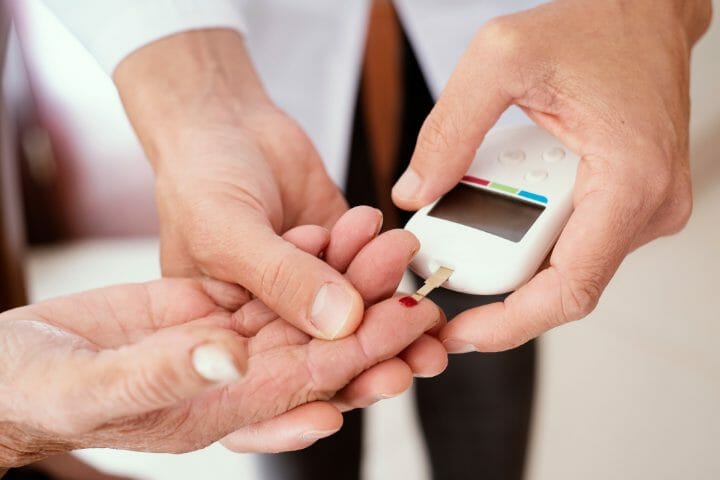
Symptoms of Hyperkalemia
Increased potassium levels in blood or hyperkalemia can be dangerous and may result in a heart attack if left untreated. You must identify the symptoms of hyperkalemia and get treatment as soon as possible.
However, people can showcase little to no signs even if they have high potassium levels. Other times the symptoms may come and go and thus are difficult to notice. Some of the symptoms of hyperkalemia include:
- Irregular heartbeats or heart palpitations
- Diarrhea or abdominal pain
- Feeling nauseous or vomiting
- Pain in chest
- Weakness or numbness in muscles and limbs
You might also like to read: Is Coffee High In Potassium?
Diagnosis and Tests
Diagnosis of hyperkalemia can be difficult as there are no symptoms most of the time. A routine blood test will detect high potassium levels.
If you are experiencing any of the symptoms of hyperkalemia, get yourself checked by a doctor. The doctor will check your heartbeats for any irregular rhythm.
If they find the heart rate abnormal, they may perform an ECG or electrocardiogram on you. An ECG will showcase the changes in your heart rhythm. You also need to discuss any medical conditions that you are suffering from.
Urine and blood tests are a sure way to determine the high potassium level in your body. Also, it is better to get regular blood tests done for older adults if they are suffering from chronic kidney disease.
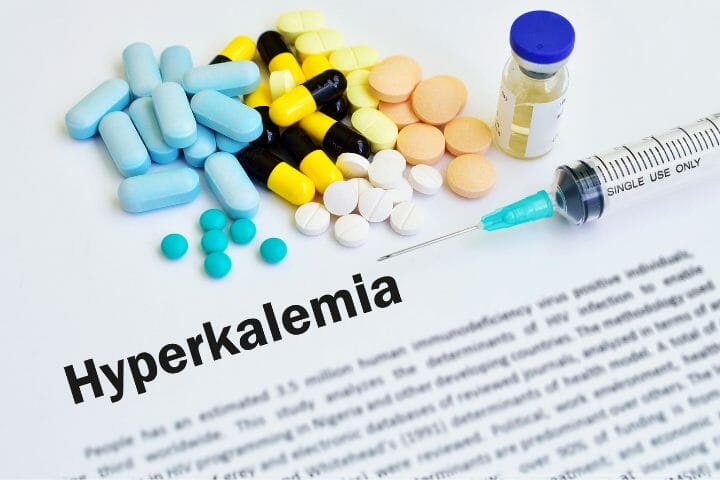
Management and Treatment
The management or treatment of hyperkalemia depends on its severity. There are several possible ways to treat or control hyperkalemia.
- Low-potassium diet: If your hyperkalemia is on a lower level, it is possible to manage and control it by making some dietary changes. Depending upon your diagnosis, your doctor will recommend lowering the intake of high-calorie food items.
- Intravenous Therapy: If you have acute hyperkalemia, it requires immediate medical attention. Acute hyperkalemia affects the heart, and thus your doctor would infuse calcium using IV therapy to protect it. You may also need insulin to help move excess potassium along your blood and to the kidneys.
- Changing medications: If your high potassium level is due to some medications you are taking, you would need to either stop taking medicine or change it to some other treatment. However, you should not do this independently without a doctor’s consultation, as that can result in further complications.
- Water Pills: Water pills or diuretics is a treatment option for reducing potassium level. It works by increasing urine production in the body and thus eliminating more potassium from your body every time you pee.
- Potassium Binders: Another medication that helps lower potassium levels in your body is potassium binders. It binds excess potassium in your body with your bowels and thus effectively eliminates extra potassium. Doctors resort to this solution if no other treatment works.
- Dialysis: In extreme conditions, when none of the other options work, your doctor will perform dialysis to help get rid of excess potassium from your body.
You might also like to read: How To Treat Low Sodium In The Elderly? A Complete Guide To Hyponatremia
Prevention
One of the best ways to prevent hyperkalemia in older adults is to follow a proper diet. People above age 65 or having chronic kidney disease should take more care of their diet as they are more prone to develop hyperkalemia.
To prevent hyperkalemia, you would need to lower or completely cut off the intake of food items high in potassium. Food items like oranges, tomatoes, prunes, nuts, chicken, milk, protein, beef and others have high potassium levels. You should consult a doctor on how much potassium you need and get a diet chart prepared according to it.
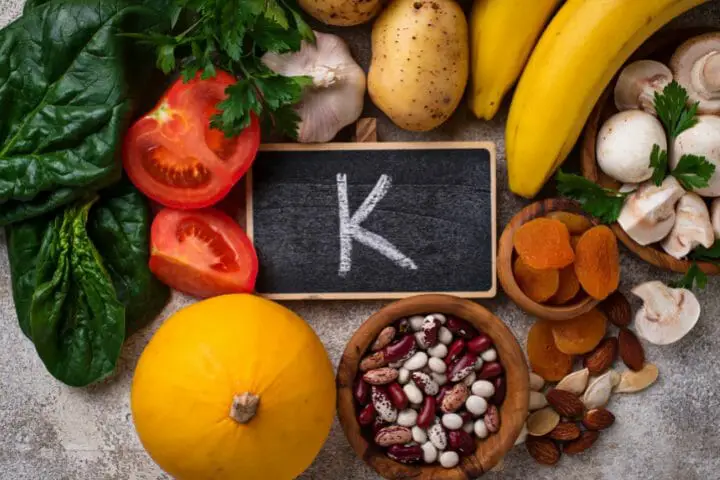
Frequently Asked Questions
What is the most likely cause of the elevated potassium level?
One of the most likely causes of elevated potassium levels is kidney disease. One of the kidney functions includes balancing the level of potassium in our body. When we intake potassium from our food, our kidney filters it from the food and discards it along with urine.
If you are suffering from kidney disease, it can result in increased potassium levels in your body. Another likely cause of elevated potassium levels in your body is a high potassium intake.
If your regular food intake consists of food items high in potassium, then it can also result in increased potassium levels. If you are on some medication and have an elevated potassium level in your body, then chances are any medicines are causing your renal function to stop.
What is the quickest way to lower potassium levels?
Even though potassium is essential for the human body, having too much of it can be dangerous and can cause severe damage to your heart, to the extent of causing cardiac arrest. However, there are a few ways to help quickly lower potassium levels in your blood.
Lowering down your potassium intake by taking low-potassium diet. Your doctor can recommend following a diet free of foods high in potassium to effectively lower potassium levels in your body.
Some people may also require medication to reduce the potassium in their body and may need to continue the medicines to avoid further elevation of potassium. Water pills and potassium binders are two such medicines. Water pills work by increasing the urine production in your body and thus effectively removing excess potassium along with it. Potassium binders work by binding the extra potassium with your bowel.
Wrap Up
People’s health degrades with age and makes them more prone to suffer from several health conditions. One such condition is hyperkalemia or an increased level of potassium in the blood, which can be dangerous if left untreated.
However, it is possible to control and manage hyperkalemia with proper treatment and lifestyle changes. Thank you for reading the article. I hope you were able to find answers to your queries.
